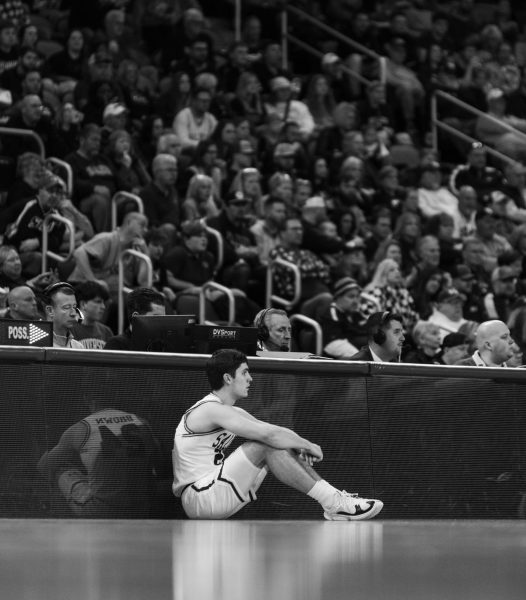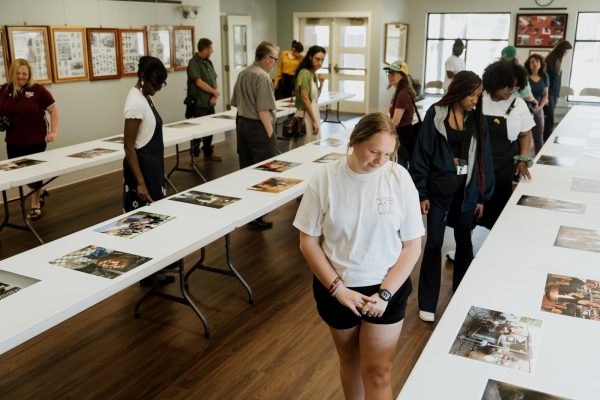Red Cross facing their worst blood shortage in ten years
Dustin Clark | @dustinclark.oof
Red Cross facing their worst blood shortage in ten years
The American Red Cross is experiencing the worst blood shortage in ten years according to the press release they made on Jan 11.
There has been a 10% drop in blood donations since the beginning of the COVID-19 pandemic. Another statement, released on Feb. 7 said recent winter storms prevented over 17,000 blood donations from being collected.
The Morris Library hosted a blood drive on Feb. 11 to help combat the blood shortage. Gary Shepherd, the senior library specialist said the library has been hosting the blood drive for years.
Advertisement
“This is actually something we’ve been doing for many years now. We usually hold one once a semester, so two or three times a year,” Shepherd said. “It’s a good central location and a lot of people visit the library so it’s a good place to pull in foot traffic.”
Shepherd said because the library has a tradition of exceeding the blood donation goal and encouraging people to donate it will help people in the long run.
“We have regular people, like ones that work in the library, who come every time,” Shepherd said. “We always encourage new donors and try to get people into the habit of giving blood.”
Shepherd said if people are able to donate blood they should because you would not only be helping combat the blood crisis, but saving a life as well.
Beth Elders, the executive director for the Red Cross for the St. Louis area, said as last year and pandemic went on the need for blood continued to increase.
Elders said in 2020 there was an increase in blood donation because a lot of people did not have anything to do. Then in 2021 donations started to decrease people started
“We saw through 2021, as people returned to work, and returned to school, and started traveling more, blood donations and that desire to unnecessarily help someone through giving blood fell off of their radar,” Elders said.
Advertisement*
Elders said while the pandemic has contributed a big part to the recent blood crisis, when less and less people decided to donate blood that caused a serious drop in blood donations.
Elders said the blood shortage is not only affecting them, but hospitals as well.
“If they have a trauma victim come in, and they need numerous units of blood, we may or may not have it on the shelf,” Elders said. “It also means if there are patients, like sickle cell patients or other patients who receive regular blood transfusions, they may have to have those blood transfusions rescheduled [..] because the blood is not available for use.”
Some hospitals now are having to prioritize surgeries based on the patient’s blood needs, Elders said.
Sharon Watson, the regional communications director for the Red Cross in Missouri and Arkansas, said, while donations have gone down a bit in the past with people traveling and planning for the holidays, this type of decrease was unexpected.
“Some of that we typically see around the holiday season as we go into thanksgiving, and Christmas, and people begin to travel more,” Watson said. “But, this year, with the pandemic, it was a lot worse, and the pandemic has really impacted so many different things related to blood donations. That’s why we believe the shortage has gotten as low as it has.”
Watson said last month they did see a slight improvement in regards to the blood shortage, but they are still struggling.
“We definitely need to continue to see that improvement and continue to have more donations to be able to get us back on track and get us beyond this shortage,” Watson said. “We like to have at least five days’ blood supply on the shelf and unfortunately we’re still seeing somewhere roughly around a day’s supply.”
Watson said because the weather has caused many blood drives to be canceled, they encourage people to reschedule and help them get the blood supply back to where they need it to be.
According to Elders, donating blood can make a big difference in so many lives and does not take that much time at all.
“Blood donation makes a difference in the lives of others. And it’s something that they can do in, you know, 30 minutes, 45 minutes or less than those times to really make a difference in somebody else’s life. It’s an easy way to make a difference,” Elders said.
Assistant to the Editor Janiyah Gaston can be reached at [email protected] or on Twitter @DEJaniyah. To stay up to date with all your Southern Illinois news follow the Daily Egyptian on Facebook and Twitter.
Advertisement









